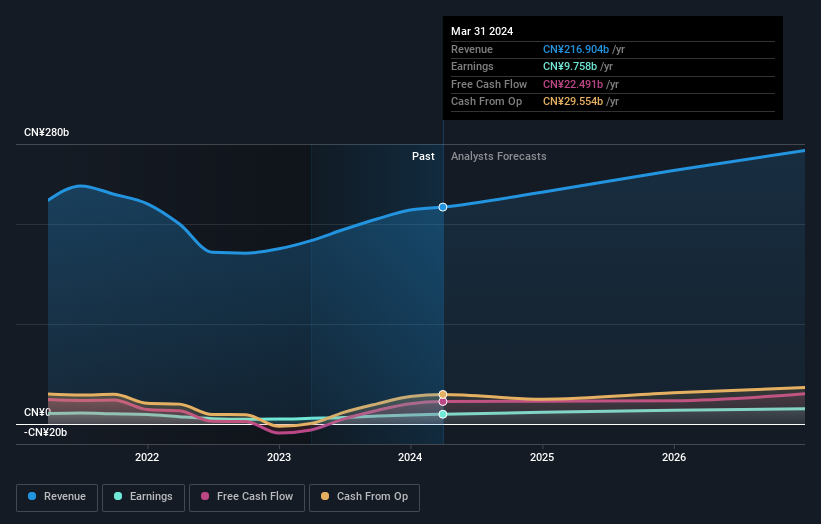Weichai Power Co., Ltd.'s (HKG:2338) market cap dropped HK$5.7b last week; individual investors who hold 49% were hit as were institutions

Key Insights
- Significant control over Weichai Power by individual investors implies that the general public has more power to influence management and governance-related decisions
- The top 25 shareholders own 40% of the company
- Institutional ownership in Weichai Power is 30%
Every investor in Weichai Power Co., Ltd. (HKG:2338) should be aware of the most powerful shareholder groups. The group holding the most number of shares in the company, around 49% to be precise, is individual investors. In other words, the group stands to gain the most (or lose the most) from their investment into the company.
While the holdings of individual investors took a hit after last week’s 5.3% price drop, institutions with their 30% holdings also suffered.
Let's delve deeper into each type of owner of Weichai Power, beginning with the chart below.
Check out our latest analysis for Weichai Power

What Does The Institutional Ownership Tell Us About Weichai Power?
Institutional investors commonly compare their own returns to the returns of a commonly followed index. So they generally do consider buying larger companies that are included in the relevant benchmark index.
Weichai Power already has institutions on the share registry. Indeed, they own a respectable stake in the company. This implies the analysts working for those institutions have looked at the stock and they like it. But just like anyone else, they could be wrong. It is not uncommon to see a big share price drop if two large institutional investors try to sell out of a stock at the same time. So it is worth checking the past earnings trajectory of Weichai Power, (below). Of course, keep in mind that there are other factors to consider, too.

We note that hedge funds don't have a meaningful investment in Weichai Power. Shandong Heavy Industry Group Co., Ltd. is currently the largest shareholder, with 16% of shares outstanding. With 3.4% and 1.9% of the shares outstanding respectively, Weifang Investment Corporation Limited and China Securities Finance Corp, Asset Management Arm are the second and third largest shareholders.
Our studies suggest that the top 25 shareholders collectively control less than half of the company's shares, meaning that the company's shares are widely disseminated and there is no dominant shareholder.
While it makes sense to study institutional ownership data for a company, it also makes sense to study analyst sentiments to know which way the wind is blowing. Quite a few analysts cover the stock, so you could look into forecast growth quite easily.
Insider Ownership Of Weichai Power
While the precise definition of an insider can be subjective, almost everyone considers board members to be insiders. Management ultimately answers to the board. However, it is not uncommon for managers to be executive board members, especially if they are a founder or the CEO.
Insider ownership is positive when it signals leadership are thinking like the true owners of the company. However, high insider ownership can also give immense power to a small group within the company. This can be negative in some circumstances.
We can see that insiders own shares in Weichai Power Co., Ltd.. The insiders have a meaningful stake worth HK$2.5b. we sometimes take an interest in whether they have been buying or selling.
General Public Ownership
The general public-- including retail investors -- own 49% stake in the company, and hence can't easily be ignored. While this size of ownership may not be enough to sway a policy decision in their favour, they can still make a collective impact on company policies.
Private Company Ownership
We can see that Private Companies own 19%, of the shares on issue. Private companies may be related parties. Sometimes insiders have an interest in a public company through a holding in a private company, rather than in their own capacity as an individual. While it's hard to draw any broad stroke conclusions, it is worth noting as an area for further research.
Next Steps:
I find it very interesting to look at who exactly owns a company. But to truly gain insight, we need to consider other information, too. Be aware that Weichai Power is showing 1 warning sign in our investment analysis , you should know about...
If you are like me, you may want to think about whether this company will grow or shrink. Luckily, you can check this free report showing analyst forecasts for its future.
NB: Figures in this article are calculated using data from the last twelve months, which refer to the 12-month period ending on the last date of the month the financial statement is dated. This may not be consistent with full year annual report figures.
Valuation is complex, but we're here to simplify it.
Discover if Weichai Power might be undervalued or overvalued with our detailed analysis, featuring fair value estimates, potential risks, dividends, insider trades, and its financial condition.
Access Free AnalysisHave feedback on this article? Concerned about the content? Get in touch with us directly. Alternatively, email editorial-team (at) simplywallst.com.
This article by Simply Wall St is general in nature. We provide commentary based on historical data and analyst forecasts only using an unbiased methodology and our articles are not intended to be financial advice. It does not constitute a recommendation to buy or sell any stock, and does not take account of your objectives, or your financial situation. We aim to bring you long-term focused analysis driven by fundamental data. Note that our analysis may not factor in the latest price-sensitive company announcements or qualitative material. Simply Wall St has no position in any stocks mentioned.
About SEHK:2338
Weichai Power
Engages in the manufacture and sale of diesel engines, automobiles, and other automobile components in China and internationally.
Flawless balance sheet, good value and pays a dividend.


